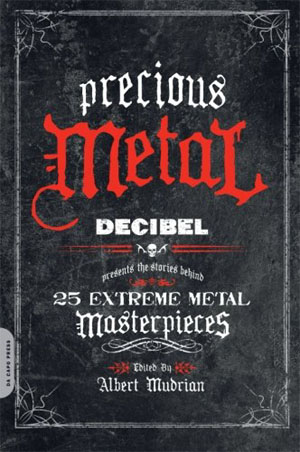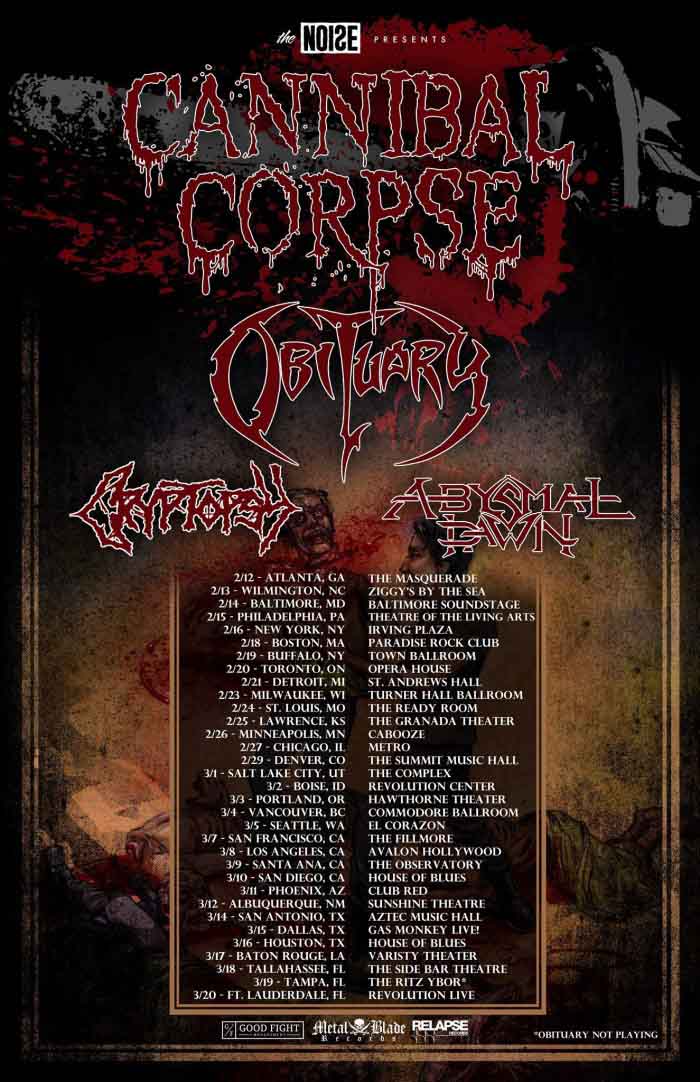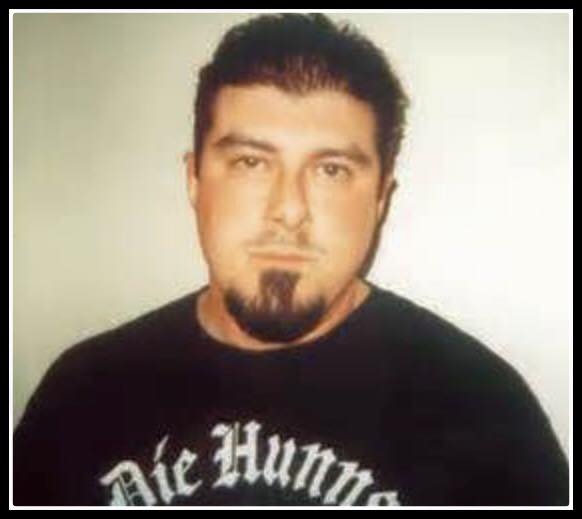Precious Metal:
Decibel Presents the Stories Behind 25 Extreme Metal Masterpieces
edited by Albert Mudrian
365 pages, Da Capo Press, $14
|
The 25 Masterpieces
|
Black Sabbath – Heaven and Hell
Diamond Head – Lightning to the Nations
Celtic Frost – Morbid Tales
Slayer – Reign in Blood
Napalm Death – Scum
Repulsion – Horrified
Morbid Angel – Altars of Madness
Obituary – Cause of Death
Entombed – Left Hand Path
Paradise Lost – Gothic
Carcass – Necroticism — Descanting the Insalubrious
Cannibal Corpse – Tomb of the Mutilated
|
Darkthrone – Transilvanian Hunger
Kyuss – Welcome to Sky Valley
Meshuggah – Destroy Erase Improve
Monster Magnet – Dopes to Infinity
At the Gates – Slaughter of the Soul
Opeth – Orchid
Down – NOLA
Emperor – In the Nightside Eclipse
Sleep – Jerusalem
The Dillinger Escape Plan – Calculating Infinity
Botch – We Are the Romans
Converge – Jane Doe
|
|
Eyehategod – Take as Needed for Pain
|
 Rock journalism challenges even the bravest writer. Musicians are not known for being articulate, nor is it easy to pin them down, and lore snowballs in that vacuum. For this reason it’s great to see the series of in-depth explorations that have come about recently regarding many classic events of metal. As musicians age, given that musicians have a shorter life-span than average, this is also a race against time in many cases.
Rock journalism challenges even the bravest writer. Musicians are not known for being articulate, nor is it easy to pin them down, and lore snowballs in that vacuum. For this reason it’s great to see the series of in-depth explorations that have come about recently regarding many classic events of metal. As musicians age, given that musicians have a shorter life-span than average, this is also a race against time in many cases.
Albert Mudrian’s Precious Metal: Decibel Presents the Stories Behind 25 Extreme Metal Masterpieces presents a welcome addition to the genre of historical metal journalism. Combing through archives, the writers of each piece compiled band statements about the album and put them together in linear form, like a conversation. The result is a whole lot of information delivered in a very digestible form, with the extraneous confusion of live interviews edited right out of the picture. It’s a good starting point for anyone looking into these historical nodal points in the evolution of metal.
Mudrian seems aware how easily a book like this could become repetitive. Not just in the answers, where musicians might make roughly similar statements about touring, band formation, the troubles of collaboration and so forth, but in the similarity of bands. If for example he added another three Swedish death metal bands, it might start to get a little bit stuffy in the virtual room he’s created. Instead, he gives us space between acts and a wide variety of acts, but avoids the really awful nu-metal and tek-deth. However, the price of that spaciousness is that he includes bands like Monster Magnet and Kyuss which really aren’t metal at all.
There are some shockers in content, too. Some of these bands, despite their professions of various depraved behaviors, are insanely business-like in how they go about getting recorded and published. Sleep, Cannibal Corpse, Dillinger Escape Plan, Botch and Converge really had their act together. For a few moments, it was more like reading Forbes than Decibel, but it’s really gratifying to see this side of the business portrayed honestly. If you want your music heard, there’s a certain amount of business activity that must precede that event.
On the whole, these chapters are extremely well edited including the choice of material. They are in question-answer form, where the questions are usually prompts about historical events or general questions applied to specific moments or activities. When an incidental or minor character is cited, he or she speaks up for a few questions and then fades out. The bulk of the material favors the most articulate band members and major actors, but the writers shoehorn in as many diverse perspectives as they can. This makes reading Precious Metal: Decibel Presents the Stories Behind 25 Extreme Metal Masterpieces feel like being in a comfortable pub with these bands, on a rainy day, with a tape recorder next to the ashtray.
Each chapter corresponds to a classic album and comes with an intro paragraph. If anything, here’s where the book could benefit from some uniformity and toning down the “rock journalism” aspects. Perhaps not a just-the-facts-ma’am approach, but more of an assessment of where the band fits into history and why people like them, and leave it at that. Some of these were over the top for the actual function they serve. However, among the bombast is a lot of good information.
At that point the interview(s) compiled into a single form take over. Most of Precious Metal: Decibel Presents the Stories Behind 25 Extreme Metal Masterpieces is the bands speaking, and that is the power of Mudrian’s editing and the work of his colleagues. They’ve trimmed out the transient stuff, the window dressing and repetition, and left us with clear statements from the bands that show them in their own voices and approaching the situation at their own angle. This also helps create an epic feel to the epic interviews because it’s a compilation of the best moments of the band commenting on this album, put into one form that flows naturally.
Was the intro, “Human,” something you had conceived of before you went into the studio?
Ain: Yes, we had the idea before we went into the studio — we wanted to loop a scream and make it perpetual. We also wanted to use it as an intro for the live shows. A regular human scream would never last that long, so we wanted to loop it and make it sound like a scream from hell, like how you would scream if the pain was everlasting.
Warrior: We had talked about it, but we were basically still laymen, so we had no idea how we could put it together. So we told Horst what we wanted to do, and he proposed how to do it. But as I said, we only had six days to do everything. If one thing failed, we would’ve gone over budget or had to go home. So, in hindsight, it’s a miracle that tracks like “Human” or “Danse Macabre” came out the way we wanted them to. We couldn’t rehearse some of those parts, you know? I have no idea how we did that in just a few days, especially given our lack of experience. But therein lies one of the strengths of Celtic Frost to this day: Martin and I usually visualize certain pieces of music down to the last detail without even touching an instrument.
This excerpt reveals the power of Precious Metal: Decibel Presents the Stories Behind 25 Extreme Metal Masterpieces. In the midst of the mundane description of studio struggles, Tom Warrior articulates part of the essence of his band. Many such moments of insight, casually and offhandedly mentioned in describing some rather ordinary thing, flesh out this book and make it more than a fan’s quest but a resource for musicians and anyone else curious about the origins and process of creating extreme metal.
Not everyone will agree on certain aspects of this book and naturally any choices made along these lines are divisive. However, the book has enough to offer just about anyone who loves metal so that the purchase will not be regretted, even if there are chapters you skipped. In fact, I recommend skipping those chapters and approaching this book as a buffet. No matter what sub-genres you adore, you’re going to have at least five you’re dying to read, another five you’re very excited to read, and another five you’re curious about, and the rest will be uncertain but you might find some interesting information there, as I did.
It is impossible to find just 25 to represent metal. Some of these choices are nods to the music industry and mainstream fanbase, like Dillinger Escape Plan, or to history, like Botch, who were the vanguard of the metalcore movement. Some are near-misses like the apologetic At the Gates treatment of their best-seller, but this interview also confirms a lot that reviewers said about this album, namely that it was retro to the past generation of metal and somewhat hasty. Some others, like Converge and Eyehategod, seem marginal in that these bands spent a lot of time disclaiming metal back in the day.
On the whole however Precious Metal: Decibel Presents the Stories Behind 25 Extreme Metal Masterpieces offers a good pan-and-scan perspective of what was going on in metal at the time, and by showing us the fly-over accumulation of variety, Mudrian and Decibel show us not only what these bands were doing, but the forces against which they were struggling to define themselves. The result is a treasure hunt of a book, bristling with secrets and previously undiscovered pathways, for those who enjoy extreme heavy metal.
7 CommentsTags: albert mudrian, At the Gates, black sabbath, books, cannibal corpse, carcass, celtic frost, darkthrone, decibel, diamond head, emperor, entombed, extreme metal, eyehategod, morbid angel, napalm death, obituary, paradise lost, repulsion, slayer







